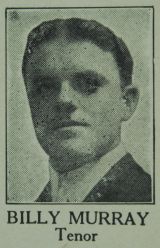Billy Murray
Billy Murray (born May 25, 1877 in Philadelphia , Pennsylvania as William Thomas Murray , † August 17, 1954 in Jones Beach , New York ) was an American singer . Murray is considered the most successful artist in the early record industry.
Life
Childhood and youth
Murray was the son of Irish immigrants and grew up in Denver , Colorado , where the family moved in 1883. Murray became interested in show business at an early age and was part of Harry Leavitt's High Rollers , a wandering show , as a teenager in 1893 .
Career
Ascent
For the next ten years Murray traveled around with minstrel and vaudeville shows . It was at one of those vaudevilles that Murray got his name "Billy". Head Al G. Fields found this to be a better fit for an artist and comedian like Murray. Murray made his first recordings in 1897 with Matt Keefe at a local cylinder company in San Francisco . It was not until 1903 that Murray made his first solo recordings , probably for Edison Records . In the next few years Murray played a large number of titles for the various major labels Columbia Records , Victor Records and Edison. The first recordings with Ada Jones appeared in 1906 , and they quickly became hits. Murray's tenor was well received and quickly made him one of the most sought-after and successful singers of his era. The American Quartet was formed for him and accompanied him on his recordings. For Edison, the quartet became the Premier Quartet and with a fifth member from time to time also the Heidelberg Quintet .
Joel Whitburn wrote in his book Pop Memories, 1890-1954: The History of American Popular Music , that a total of 44 of Murray's singles became hits. According to Whitburn, he had his first with Tessie in 1903 .
In 1909 Murray signed a ten-year contract with Victor for records and with Edison for cylinder recordings, which was a rather rare practice at the time. Usually the artists weren't permanently under contract with any label, but switched back and forth between the record companies. Still, the exclusive deals with Victor and Edison seemed to have been a good move, as his career peaked between 1909 and 1920. His comic and novel songs sold extremely well. Murray is considered one of the "recording pioneers", the pioneers of the modern record industry.
Later career
In 1920, when cylinder technology was out of date, Murray signed another exclusive contract with Victor, this time only for records. Even so, its popularity began to wane in the mid-1920s, especially with the advent of other popular musical styles such as jazz . Murray stayed with Victor until 1927, then switched to cheaper labels. As a talented and passionate comedian, he tried his hand at radio during the 1930s and simultaneously played for RCA Victor's sublabel Bluebird and Joe Davis ' Beacon Records until the early 1940s a less successful records. A few years later, Murray retired from the music business due to a heart condition .
Murray died relatively unnoticed and forgotten in 1954.
plant
Billy Murray is considered one of the pioneers in the record industry. He has been in business since the early 20th century and is even considered the most successful singer of his era in the United States. His success was fundamental to the further course of the music industry.
Web links
- Entry in the All Music Guide
- Billy Murray music to listen to and free download
| personal data | |
|---|---|
| SURNAME | Murray, Billy |
| ALTERNATIVE NAMES | Murray, William Thomas (real name) |
| BRIEF DESCRIPTION | American pop and novelty singer |
| DATE OF BIRTH | May 25, 1877 |
| PLACE OF BIRTH | Philadelphia , Pennsylvania |
| DATE OF DEATH | 17th August 1954 |
| Place of death | Jones Beach , New York |

